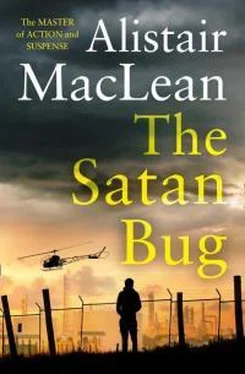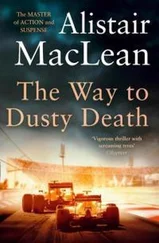Алистер Маклин - The Satan Bug
Здесь есть возможность читать онлайн «Алистер Маклин - The Satan Bug» — ознакомительный отрывок электронной книги совершенно бесплатно, а после прочтения отрывка купить полную версию. В некоторых случаях можно слушать аудио, скачать через торрент в формате fb2 и присутствует краткое содержание. Год выпуска: 2011, Издательство: Sterling, Жанр: Боевик, Шпионский детектив, на английском языке. Описание произведения, (предисловие) а так же отзывы посетителей доступны на портале библиотеки ЛибКат.
- Название:The Satan Bug
- Автор:
- Издательство:Sterling
- Жанр:
- Год:2011
- ISBN:нет данных
- Рейтинг книги:3 / 5. Голосов: 1
-
Избранное:Добавить в избранное
- Отзывы:
-
Ваша оценка:
- 60
- 1
- 2
- 3
- 4
- 5
The Satan Bug: краткое содержание, описание и аннотация
Предлагаем к чтению аннотацию, описание, краткое содержание или предисловие (зависит от того, что написал сам автор книги «The Satan Bug»). Если вы не нашли необходимую информацию о книге — напишите в комментариях, мы постараемся отыскать её.
The Satan Bug — читать онлайн ознакомительный отрывок
Ниже представлен текст книги, разбитый по страницам. Система сохранения места последней прочитанной страницы, позволяет с удобством читать онлайн бесплатно книгу «The Satan Bug», без необходимости каждый раз заново искать на чём Вы остановились. Поставьте закладку, и сможете в любой момент перейти на страницу, на которой закончили чтение.
Интервал:
Закладка:
Again the close thunder of the explosion and this time I was sure my right thumb had gone. But I hardly cared. The wire binding me to the wine-bin was neatly severed in half. Buffalo Bill couldn’t have done it any better.
I twisted, grabbed one of the wine-bin supports with my all but useless hands, hoisted myself shakily to my feet, rested my left elbow on a convenient shelf and stood there waiting, staring at the door. Anyone coming to investigate would have to pass through that door and, as a target, a man at six feet was going to be a much simpler proposition altogether than a wire at eighteen inches.
For a whole minute I stood there motionless apart from the trembling of my legs, straining to the utmost what little the gunshots had left me of my hearing. Nothing. I risked a couple of quick hops out to the centre of the cellar and peered up through the high window in case my gaoler was playing it careful and smart. Again nothing. Another couple of hops and I was by the door testing the handle with my elbow. Locked.
I turned my back on the door, scrabbled around with the muzzle of the Hanyatti until I’d found the lock, and pulled the trigger. With the second shot the door gave abruptly beneath my weight – it says much for the state of mind that I’d never even checked the position of the hinges to see whether the door opened inwards or outwards – and I fell heavily through the doorway on to the concrete passage-way outside. If there was anyone waiting out there with the hopeful intention of clobbering me, he’d never have a better chance.
No one clobbered me because there was no one waiting there to clobber me. Dazed and sick I pushed myself wearily to my feet, located a light switch and clicked it with my shoulder. The naked bulb, hanging at the end of a short flex above my head, remained dead. It could be a dud lamp, it could be a blown fuse, but my guess was that it meant no power at all: the air in that cellar had the musty lifelessness that bespoke long abandonment by whoever had once owned the house.
A flight of worn stone steps stretched up into the gloom. I hopped up the first two steps, teetered on the point of imbalance like a spinning top coming to rest but managed to twist round quickly and sit down before I toppled. Once down, it seemed the safe and prudent thing to do to keep my centre of gravity as low as possible by staying there, and I made it to the top of the stairs by jackknifing upwards on the seat of my pants and the soles of my shoes.
The door at the head of the cellar stairs was also locked but it wasn’t my door and I still had five shots left in the Hanyatti. The lock gave at the first shot and I stumbled out into the hallway beyond.
The hallway, high, wide, and narrow, featured what estate agents euphemistically call a wealth of exposed timbering – black, ugly, adze-cut oaken beams everywhere. Two doors on either side, both closed, a glass door at the far end, another beside me leading presumably to the rear of the house, a staircase above my head and an uneven parquet floor thickly covered with a dust streaked by the confused tracks of foot-prints leading from the glass door to the spot where I was standing. The finest feature of the hall was the fact that it was completely deserted. I knew now I was alone. But for how long I didn’t know. It seemed a poor idea to waste even a second.
I didn’t want to smear the tracks in the hall so I turned to the door beside me. For a change it was unlocked. I passed into another passage that gave on the domestic quarters – larder, pantry, kitchen, scullery. An old-fashioned house and a big one.
I went through those apartments, opening cupboards and pulling drawers out on to the floor, but I was wasting my time. No signs here of hasty abandonment like the keepers skipping out from the Flannan Isle lighthouse, the ex-owners had cleaned out the lot when they lit out. They hadn’t left as much as a safety pin, not that a safety pin would have been found of much value in cutting the PVC that bound hands and ankles.
The outside kitchen door was unlocked. I opened it and hopped out into the still heavily falling rain. I looked around me, but I could have been anywhere. An acre of overgrown garden completely run to seed, ten foot high hedges that hadn’t felt a clipper in years, and dripping pines and cypresses soughing under a dark and weeping sky. Wuthering Heights had nothing on it.
There were two wooden buildings not far away, one big enough to be a garage, the other less than half the size. I hopped my way towards the latter for the sound reason that it was the nearer of the two. The door hung crazily on twisted hinges and creaked dismally as I put my shoulder to the splintered wood.
It was a shed that had been obviously used as a workshop – to one side, below the filthy window, stood a massive work-bench with a rusty vice still bolted in position. If it wasn’t too rusted to turn and if I could find some cutting tool to jam into it, that vice would be useful indeed. Only, as far as I could see, there were no cutting tools of any description, no tools of any kind: as in the house, so here – the departing owners had been nothing if not thorough when it had come to the removal of their goods and chattels. The walls were completely bare.
They had left only one thing, and that because it was quite useless – a square plywood box half full of rubbish and wood-shaving. With the aid of a piece of wood I managed to tilt the box and spill its contents on the floor. With the stick I stirred the jumble of odds and ends – pieces of wood, rusty screws, bent pieces of metal, twisted nails – and, at last, a very old and rusty hacksaw blade.
It took me ten minutes to jam the blade into the vice – my hands were numbed to the point of almost paralytic uselessness – and another ten minutes to saw my way through the PVC binding my wrists. I could have done it in far less time but as, with my hands behind my back, I couldn’t see what I was doing, I had to go easy: I could have sawn through an artery or a tendon just as easily as through a wire and I wouldn’t have been able to tell the difference. My hands were as lifeless as that.
They looked pretty lifeless too, when I’d severed the last PVC strand and brought them round to the front for examination, swollen to a size half as much again as normal with smooth, bluish-purple distended skin and the blood swelling slowly from torn skin on the inside of both wrists and most of my fingers. I hoped that the dark flaking rust on the blade of the hacksaw that had caused those cuts wasn’t going to give me blood-poisoning.
I sat on the side of the box for five minutes, cursing savagely as the mottled purple of my hands slowly began to vanish and the circulation to come pounding back with the almost intolerably exquisite agony of a thousand barbed needles tearing at the flesh. When I could at last hold the hacksaw blade in my hands, I cut the PVC on my ankles and cursed some more, just as colourfully as before, till the blood supply in my feet came back to something like normal. I pulled up my shirt to have a look at the right-hand side of my chest and just as quickly and roughly stuffed the shirt back under the waistband of my trousers. A prolonged inspection would only have made me feel twice as ill as I was already: in the few clear patches in the thick crust of blood that covered almost all of the side of my body the grotesquely swelling bruises were already turning all the kaleidoscopic colours of the rainbow. I thought sourly that if the man who had used me for football practice had chosen the left instead of the right side of my chest he’d have broken all his toes on the Hanyatti. It was as well that he hadn’t.
I had the Hanyatti in my hand as I left the tool-shed, but I didn’t really expect to have to use it. I didn’t go near the house – I knew I’d find nothing there except the footprints and that was a matter for Hardanger’s experts. From the front of the house a driveway curved away between dripping pines and I limped off down the weed-grown gravel. It would have to lead to a road of sorts.
Читать дальшеИнтервал:
Закладка:
Похожие книги на «The Satan Bug»
Представляем Вашему вниманию похожие книги на «The Satan Bug» списком для выбора. Мы отобрали схожую по названию и смыслу литературу в надежде предоставить читателям больше вариантов отыскать новые, интересные, ещё непрочитанные произведения.
Обсуждение, отзывы о книге «The Satan Bug» и просто собственные мнения читателей. Оставьте ваши комментарии, напишите, что Вы думаете о произведении, его смысле или главных героях. Укажите что конкретно понравилось, а что нет, и почему Вы так считаете.












